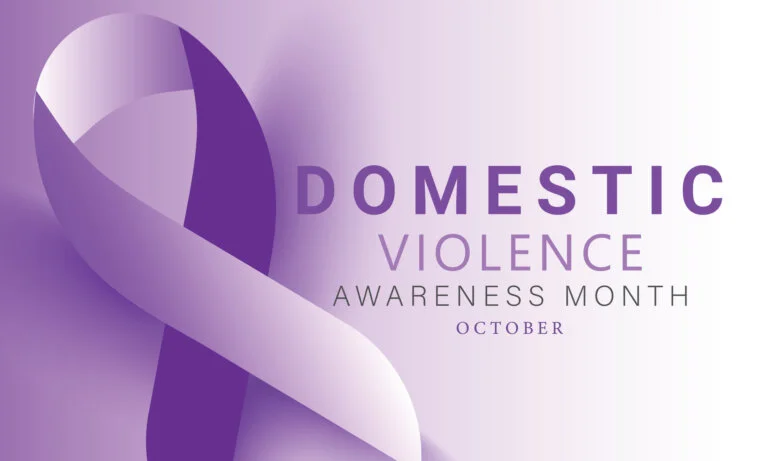October is Domestic Violence Awareness Month, and while much of the focus tends to be on the criminal prosecution of abusers, there’s a crucial avenue that often gets overlooked: civil litigation. It’s not the route many think of first, but for countless survivors of domestic violence, it can be the difference between feeling voiceless and reclaiming power over their own stories.
The first time I represented a victim of domestic violence was when I was an intern in law school for a client, whom I’ll call Sarah for this blog. Her story, like so many others, began with a relationship that turned toxic, abusive, and violent. Sarah stayed with “Tom” for longer than she’d ever admit to herself. Why? Because he controlled her finances, isolated her from her friends, and threatened harm if she tried to leave. Eventually, the abuse escalated to threats against their children. That was the tipping point.
Sarah did what most people in her situation are told to do: she reported him. The police arrested Tom, and the criminal justice system took over. For the first time in years, Sarah had hope that justice would prevail, that the man who tormented her would finally face consequences.
But then came the reality that so many survivors face—the system failed her. The prosecutors were overburdened, crucial evidence was mishandled, and suddenly, Tom was back on the street. Charges were dropped, leaving Sarah to question everything. Was her suffering not worth the effort? How could her abuser walk free?
Civil Court: A Different Kind of Justice
That’s when Sarah found her way to the office I was working for. She was angry, disillusioned, and ready to give up. The criminal case had closed, but the fight for justice was far from over. I explained to her that, while the criminal system might have let her down, there was still another option: civil litigation.
Unlike criminal trials, which are focused on punishing the perpetrator, civil trials are centered on the victim. It’s not about the state vs. the abuser—it’s about the survivor vs. the abuser. And here’s the most important difference: in criminal court, survivors are often relegated to the role of witness, providing evidence for the state’s case. But in civil court, the survivor’s voice is the driving force. The victim isn’t just a piece of the case; they are the case.
For Sarah, this distinction was everything. After feeling discarded by the criminal system, the civil process allowed her to reclaim control. In that courtroom, she wasn’t a passive observer watching the state decide her fate—she was the center of the case. It was her story being told, her pain being acknowledged, her fight being fought.
We filed a civil lawsuit against Tom for assault, battery, and intentional infliction of emotional distress. It wasn’t just about money; it was about making a statement that Sarah’s suffering would not be ignored or minimized. Through civil litigation, she had the power to hold her abuser accountable, even after the criminal justice system had failed.
Empowering Survivors Through Civil Action
The legal standards in civil court are also different—more accessible for survivors. In a criminal case, prosecutors have to prove guilt “beyond a reasonable doubt,” an often insurmountable hurdle when dealing with domestic violence, which tends to happen behind closed doors with little outside evidence. But in civil court, we only needed to prove that it was “more likely than not” that Tom had caused Sarah harm.
This shift in burden of proof opened up new avenues for us. We built a compelling narrative that left little doubt about what Sarah had endured.
But more than just legal strategies, civil litigation offered Sarah something the criminal courts never could—a platform for her voice. It allowed her to tell her story in full, in her own words, with the understanding that this time, it was going to make a difference.
When Sarah took the stand during the civil trial, something changed. I could see it in her face, hear it in her voice. She wasn’t afraid anymore. She wasn’t just a victim testifying about what had happened to her. She was a survivor standing up to her abuser, laying bare the truth of her experience, and demanding accountability.
The trial resulted in a substantial settlement for Sarah. Yes, the financial compensation allowed her to rebuild her life—she was finally able to move out of state, away from Tom, and start fresh with her kids. But even more significant was the verdict itself: a public declaration that what had happened to Sarah mattered. That her pain was real. That she had the right to tell her story—and to be believed.
For Sarah, and for many others like her, civil litigation provided a path to justice when the criminal system failed. It allowed her to hold Tom accountable in a way the state could not. And most importantly, it gave her a voice at a time when she felt utterly voiceless.
What the Civil System Can Do for Domestic Violence Survivors
Sarah’s story is not an anomaly—it’s part of a larger narrative that deserves more attention during Domestic Violence Awareness Month. The criminal justice system, as necessary as it is, is not perfect. It is often overloaded, bureaucratic, and ill-equipped to handle the complexities of domestic violence cases. Too many survivors, like Sarah, find themselves slipping through the cracks, with abusers walking free due to procedural errors or lack of resources.
But civil litigation offers a different kind of justice. It gives survivors the chance to take control of their narrative, to be active participants in their quest for accountability. It can provide not just financial compensation, but a sense of closure and empowerment that is often missing from the criminal process.
As a plaintiff attorney, I’ve seen firsthand how powerful civil cases can be for domestic violence survivors. If the criminal courts won’t listen, the civil system is there to make sure that survivors’ voices are heard—loudly and clearly.
If you or someone you know is a victim of domestic violence and the criminal system has let you down, don’t give up. There are still avenues for justice, and we’re here to help you find them.

